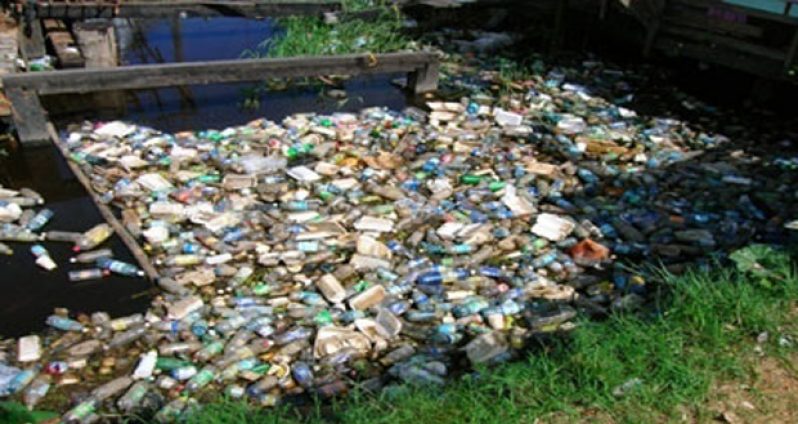Though underscoring the importance of banning the usage of Styrofoam containers, proprietors within the restaurant Industry are calling on the Government of Guyana to waiver the taxes on the imported biodegradable containers.The ban on the importation of Styrofoam containers takes effect from today January 1, 2016 but the Government has given importers and food operators a three-month grace period to utilize the

stocks in house or those that have already been shipped to Guyana. It is now encouraging the use of alternative products to closed-cell extruded polystyrene foam (Styrofoam) for the achievement of a cleaner, greener Guyana.
Francis Bristol, proprietor of Dian’s Deli – a food establishment located in Kitty, on Thursday told Guyana Chronicle that while he is in support of the ban, taking into consideration the negative impact Styrofoam has on the environment, he is of the opinion that a system needs to be put in place to cushion the impact that will be felt by the “small man.”
He further proposed that Government waivers the taxes on biodegradable containers to reduce the impact, explaining that these environmentally friendly containers are extremely expensive when compared to Styrofoam containers. According to him, it is three times higher. On the local market, a Styrofoam box is being sold for approximately $17 while a biodegradable box of a similar size is approximately $64.
“But if the Government waives the taxes on the biodegradable containers the cost will come down, maybe then it will be affordable and every shop will have it in stock,” said an optimistic Bristol.
He maintained that the question must be asked, “What is the Government willing to give in exchange? If you are going to take something from the people, you must be able to give something in return, and for me the answer is a waiver on the taxes.”
The proprietor of Hack’s Halaal Food and Take Away Service echoed similar sentiments. Mr. Hack (only name given) said there needs to be a “tax break” for individuals and enterprises that are willing to import alternative containers such as the biodegradable containers that are being sold by Caribbean Containers Incorporated (CCI).
At the moment, he said only a few entities are importing and distributing the biodegradable containers. “Based on the information I am getting there is no system in place to cushion the impact or to bring down the cost of the biodegradable containers. Do we even have enough biodegradable containers to supply the entire Restaurant Industry here in Guyana,” he said.
Until a system is put in place to reduce the cost of these containers, Hack said the consumers would have to feel the impact, saying that many food establishments will not be able to subsidize this change.
TOO COSTLY
“We will have to pass on that price to the consumers. We cannot bear the cost at all, it will be too costly for us,” he posited.

Nevertheless, Hack said he was pleased with the three months grace period put in place by Government that allow for the utilization of Styrofoam boxes that were purchased ahead of the ban.
Former President of the Georgetown Chambers of Commerce and Industry (GCCI) and owner of German’s Restaurant, Clinton Urling said approximately two years his restaurant stopped using Styrofoam containers after considering the effects they have on the environment but it came at a very high cost.
Like the other proprietors, Urling opined that the Government should reduce the tariffs on the alternative containers. “If the tariffs are reduced, more persons would import biodegradable containers,” he further opined.
But while many persons are complaining about the cost implication with regards to the switch from Styrofoam to Biodegradable containers, Executive Member of the Private Sector and Roraima Duke Lodge, Gerry Gouveia said the ban was long overdue. Like Urling, Gouveia has long cease the usage of Styrofoam containers at his establishments. Questioned about the cost implication, he said safety is never expensive.
“Expensive? Safety is not expensive. Accidents are expensive. Damage to the environment is expensive. The floods and clogged drains are expensive. Those are expensive not safety,” Gouveia said. For him, operators within the Food Industry should buy into this change for the safety of the environment.
Palm and Steve’s Restaurant and Bakery, Oasis Café, Hilton and Cara Lodge were among the first group of entities that commenced the usage of biodegradable containers after it was introduced by CCI inn 2012. These biodegradable containers are designed to decompose within 90 days after use, especially when they come in contact with bacteria, soil, oxygen and sunlight. Besides Guyana, the biodegradable food packaging containers are in full use in the United States, Canada, South Africa and the Far East Asia.
Meanwhile, the ban on Styrofoam containers was an initiative of the Ministry of Natural Resources and the Environment under the People’s Progressive Party/Civic (PPP/C) Government. It was in October, 2015 the Department of Natural Resources and the Environment signaled its intention to move ahead with the ban on Styrofoam.
At the time of the announcement, the Department pointed out that it forms part of a menu of measures to address waste management in the country and simultaneously promote the utilization of biodegradable materials.
Even as the ban takes effects, the Department remains optimistic that this initiative will see a significant reduction in the effects of polystyrene foam products on solid waste management in the country, and its negative impact on the environment.
By Svetlana Marshall



.jpg)











